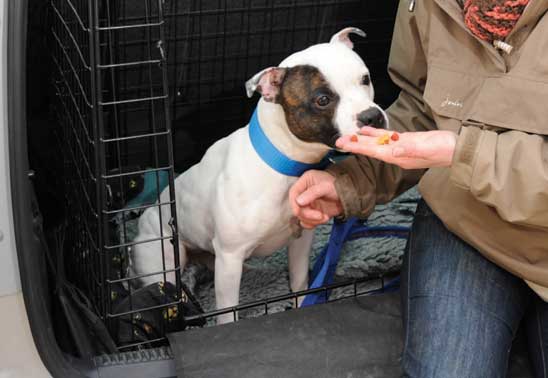Days out with your dog should be a pleasure, but anxiety or motion sickness can spoil the experience. Andrea McHugh helps get you on the road to recovery.
1. Give it time
Motion sickness is more common in younger dogs than adults. This could be because the parts of the inner ear that are involved in balance have not yet developed fully. You may find that by the time your puppy is one year old he will have outgrown the problem.
2. Frequent trips
If you only take your dog on car trips once or twice a year for something that he finds unpleasant, such as a visit to the vet, then he could begin to develop negative associations with the car. Stress can manifest in physical problems such as vomiting, excessive drooling, and diarrhoea. Short, frequent car journeys that end in something fun such as an off-lead walk or a game in the park will help to build positive associations.
3. Carefully does it
If your dog suffers with travel sickness try and avoid routes with lots of bends. Drive as carefully as possible so that you reduce the possibility of swerving and braking suddenly. Maintain the temperature of the car so that it is not too hot, and if possible keep a window open to circulate the air. Playing soothing classical music on the car radio will help keep your dog nice and calm.
4. Go ginger!
Ginger is a plant with natural anti-sickness properties. Some owners report that feeding ginger biscuits or root ginger capsules have helped to settle their dogs when travelling. Biscuits that contain real ginger are said to be more effective than cheaper ones that contain ginger flavouring.
5. Acclimatise
If your dog is stressed about travelling in the car it may take several weeks or months to help desensitise him to your vehicle, but it can be done. Begin by sitting in a stationary vehicle with the door open and your dog on your knee. Do this several times a day, stroking him and feeding the odd tasty treat.
Next put him in a harness beside you and switch the engine on as you calmly read the paper for five minutes or gently stroke him. Gradually progress until you are able to go on very short trips - five minutes around the block will be plenty at fi rst. Always end every outing with something that is really fun for the dog.
When your dog comfortably accepts each stage move to the next one, but if he starts to get sick or displays signs of stress simply go back to something he was happy with and start again.
6. Two's company!
It's a good idea to have someone else in the car during those first important journeys with your dog so that they can help to soothe and distract him. If you have another dog who travels happily this may also provide him with comfort and confidence. Looking out of the car window can induce nausea in dogs, so consider travelling him in a crate covered by a blanket.
7. To the rescue
Bach Rescue Remedy for pets is an alcohol-free blend of the original flower remedies and can be added to food, water, or treats to help dogs cope with car travel. Alternatively you can rub it on to his ears, nose, or paws.
Dorwest's Digestive Supplement contains soothing herbs such as ginger, valerian, rhubarb, and slippery elm, which help to prevent sickness in dogs who are affected by motion sickness rather than stress. Simply feed the supplement two hours prior to travelling. Speak with your vet prior to commencing any herbal or homeopathic remedies.
8. Rocky road
Placing your crate on top of a nest of duvets in the back seat of your car - rather than in the boot - may help to reduce movement and prevent nausea. Make sure you secure the crate with a seat belt to guard against sudden braking.
9. It's a wrap
An anti-anxiety wrap such as a Thundershirt is said to provide consistent, constant, gentle pressure, which almost acts like a stress-busting ‘hug' to a worried dog. Anti-anxiety wraps may also be helpful for noise phobia and other stress-induced conditions.
10. Ask your vet
Seek veterinary advice if your dog suffers with severe stress or motion sickness, as there may be a physical cause that can be treated. Prescription medications are available and your vet may also recommend the use of an Adaptil collar or spray, which contain a natural, odourless pheromone to help reduce stress and relax anxious dogs. Adaptil tablets are also available. Placing a pillow that has been stuffed with fresh lavender close to where your dog will be sitting when he travels in the car may also be helpful.
Travel pack
Create a box of useful items to help you cope if the worst happens and your dog is sick on a car journey. This should contain:
- Newspapers or puppy training pads to line the crate.
- Towels.
- Fresh blankets.
- Disposable gloves.
- Anti-bacterial hand wash.
- Carrier bags.
- Baby wipes.
Signs of motion sickness
- Whining and pacing.
- Excessive drooling.
- Lethargy or inactivity.
- Vomiting.
- Diarrhoea.
- If you think your dog is going to vomit, keep calm, park the car, put his lead on and take him out for a walk in the fresh air.







